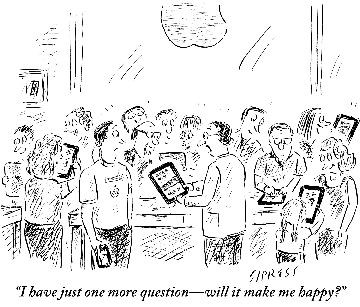Century Marks

Incognito: Samuel Beckett’s 1940 visit to Bram van Velde may have kept the Dutch painter from committing suicide. It wasn’t anything that Beckett said; it was his expression of solidarity with van Velde, who for 30 years worked in isolation and poverty and without selling one of his paintings. As a writer, Beckett too endured long periods of neglect. “It doesn’t matter if you’re not published,” Beckett told him. “One does it to be able to breathe.” Both men admired Vincent van Gogh, who never sold a single one of his paintings (review of Charles Juliet’s Conversations with Samuel Beckett and Bram van Velde, Times Literary Supplement, May 7).
Life message: David Housholder and a group of fellow Southern California preachers watched and discussed 20 public speeches, mostly by preachers, ranging from conservatives (like Joel Osteen) to liberals (like Jeremiah Wright). Each of these speakers had a life message which came from a deep place within them that God had touched. Housholder laments that too many pastors have “become footnote-ers rather than truth tellers.” People don’t come to church for information, he says. They can use Google for that. “They want to observe a living fire in a real person.” To discover his own life message, Housholder is paying attention to the things that move his heart and to the times when people “lean in” to hear him speak (Currents in Theology and Mission, February).
Money matters and Jesus: Klyne Snodgrass argues that Jesus’ teachings focus more on money than any other subject. Much of this message is unsettling to Christians who are well-off. “If we are honest,” says Snodgrass, “what most of us want is to have enough resources that we can take it easy and enjoy life; we want to be the rich fool” that Jesus condemned in Luke 12:13–21. Yet Jesus also seemed to enjoy a good celebration, which costs money. Women with money supported the work of Jesus and his disciples (Luke 8:3), and on at least one occasion a woman anointed Jesus with perfume that cost a year and a half’s wages—and Jesus expressed his approval. Nevertheless, discipleship in the kingdom calls us to a conversion about how we think of and use material possessions. They are not ours; they are on loan. “Possessions are tools for living, not something to amass,” writes Snodgrass (Word & World, Spring).
Delayed reaction: The Baptist General Convention of Texas has broken ties with the Royal Lane Baptist Church in North Dallas because it has openly gay deacons. The BGCT said it would no longer accept funds from Royal Lane and has asked the congregation to refrain from saying it is an affiliate member of the convention. A representative of the congregation says it has had a gay deacon for at least 15 years. The congregation of about 500, founded in 1952, was one of the first in the region to racially integrate its pews and to choose women as deacons and associate pastors (Dallas Morning News, May 26).
Stop the committees: Sensing that its committee structure had become a burden, Whitewater Mennonite Church in Boissevain, Manitoba, decided to take a sabbatical year from all committee work. Following the jubilee year concept (Lev. 25), nonessential tasks and decisions were set aside. Monthly congregational meetings were used to decide only essential issues. Volunteers were tapped for specific tasks, but if someone didn’t volunteer for a task, it was assumed that that person needed a sabbatical. Instead of focusing on committee work, the congregation focused on rest, reading scripture, prayer and fellowship (Mennonite Weekly Review, April 26).
Off the press: Century special correspondent Amy Frykholm has just published Julian of Norwich: A Contemplative Biography. The 14th-century Christian visionary from Norwich, England, was the first woman to write a book in English. Although Julian is a much-anthologized writer, very little is known about her life. Frykholm draws on the artifacts of the era and on Julian’s writings to create her portrait. The book is published by Paraclete Press.
As Arizona goes? While Arizona’s new immigration law may be controversial, demographically the state may be a precursor of things to come in the U.S. It has both a large Hispanic population (30 percent) and a significant generation gap: of those over 65 years of age, 83 percent are white; of those under 18, only 43 percent are white. An estimated 400,000 undocumented residents live in Arizona (Christian Science Monitor, May 24).
Philosopher on call: At AskPhilosophers.com, based at Amherst College, a panel of philosophers responds to philosophical questions. Now a mobile application for the site (AskPhil) is available for iPhone and Android cell phone users. In a recent posting, two philosophers sparred over the grounds for concluding that it is wrong to kill ants for fun (Boston Globe, May 30).
Meatless meals: The world must move toward a vegan diet, according to a United Nations report released early this month. The production of meat and dairy products accounts for 70 percent of global freshwater consumption and 38 percent of total land use. It also is responsible for 17 percent of the world’s greenhouse emissions. For starters, the report suggests, people should consider a meat-free day each week (guardian.co.uk, June 2).
Endtimes drinks: 666 Ventures LLC has launched a new line of caffeinated energy drinks available in two flavors, Virgin Sacrifice Cherry and Lucifer’s Lemonade. Intended to be irreverent and controversial, the drinks are being marketed to young people who want to stay up all night to study or party. The energy drink comes in four-ounce shots—twice the size of most energy shots (PRWeb).





